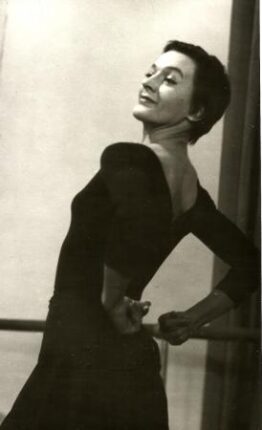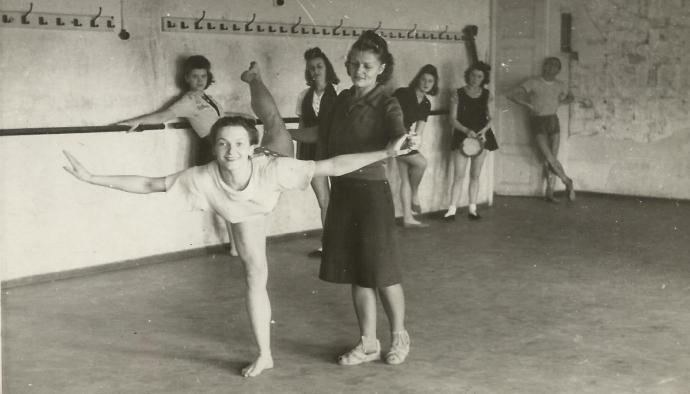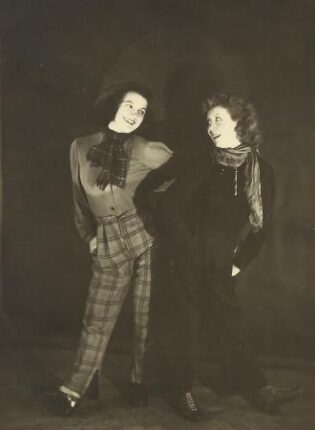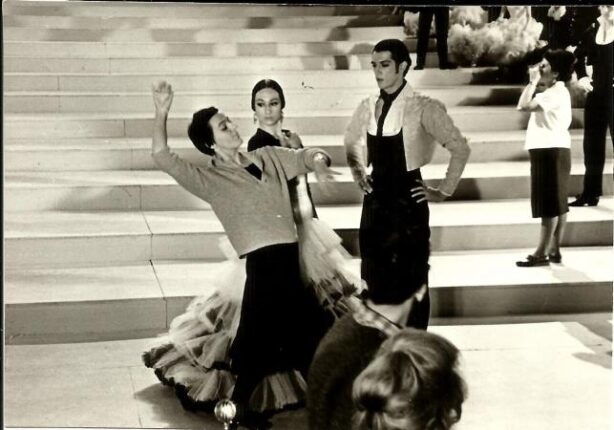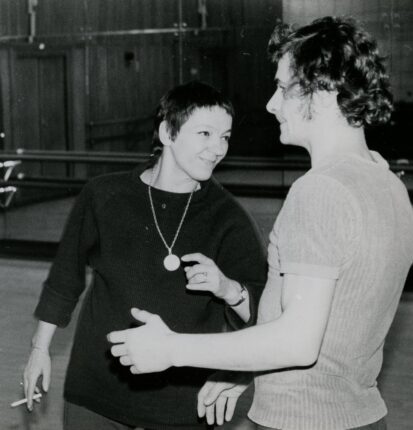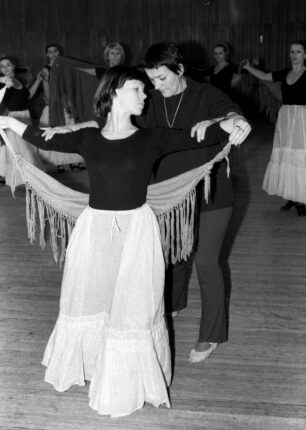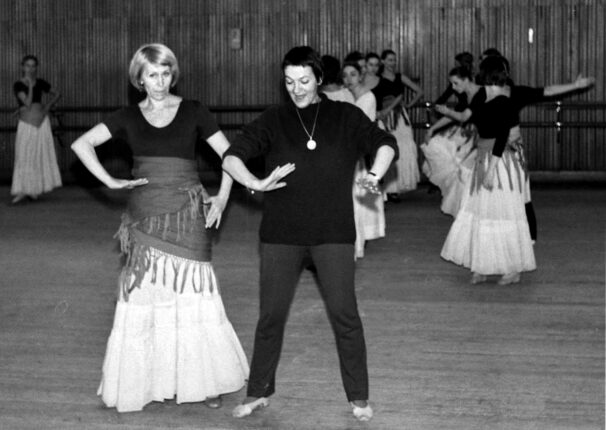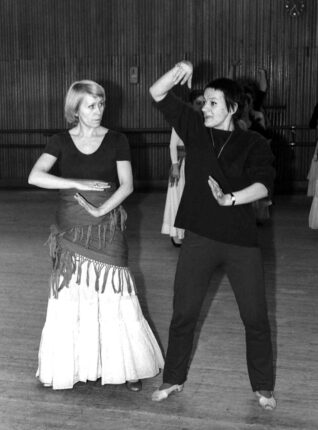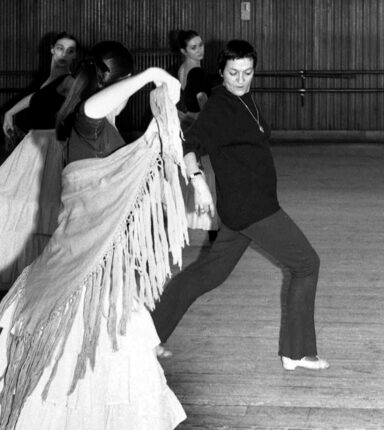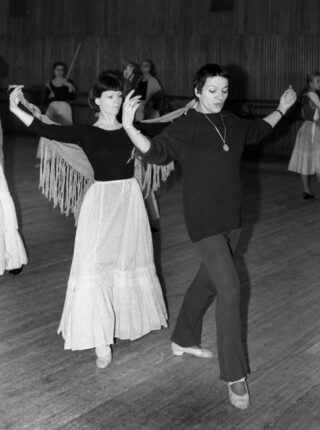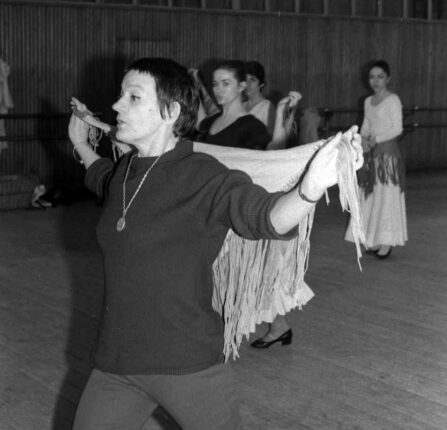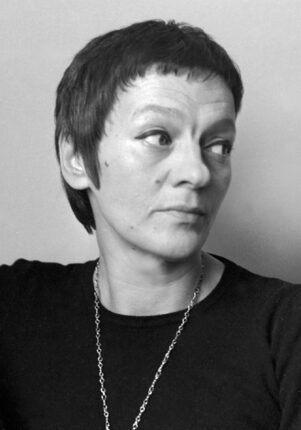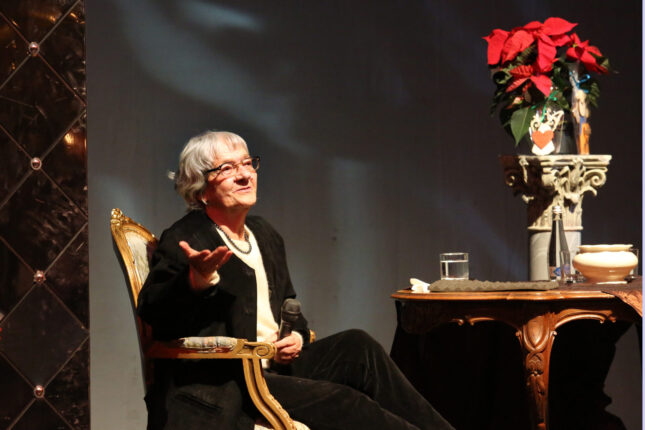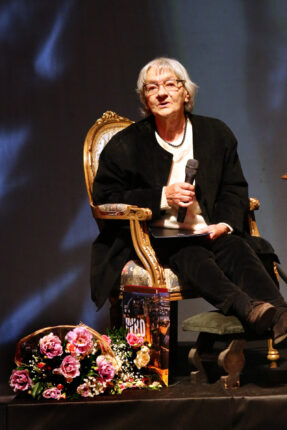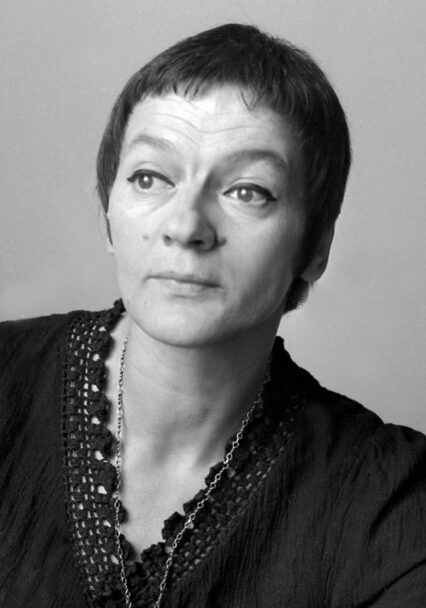Teresa Kujawa (proper name Teresa Kujawa-Knapik) was a Polish ballet dancer, choreographer, educator and director. She graduated from the Technical School of Cinematography in Poznań and the State Ballet School in Warsaw.
She debuted in 1949 at the Dolnośląski Theater in Wroclaw in a production of Eugene Labiche’s Straw Hat, directed by Jerzy Walden.
She worked as a dancer at the Dolnośląska Opera (1947-1949) and Poznań Opera (1949-1958, from 1952 onwards as a soloist), before joining the Théâtre d’Art du Ballet company, with whom she toured Western Europe, among others. She then returned to work at the Poznań Opera (1960-1971). In 1971, she became a ballet dancer at the Wrocław Opera House.
In 1974 she was appointed the choreographer of the Polish Dance Theatre – Poznań Ballet, and subsequently worked in the same capacity at the Łódź Grand Theatre (1975), Wrocław Opera (1976-1982) and the Grand Theatre in Warsaw (1982-1989). She was ballet director at the Wrocław Opera and the Grand Theatre in Warsaw, as well as director of the Szczecin Opera and Operetta.
As an educator, she was actively involved with the State Ballet School in Poznań (1954-1971), State Ballet School in Warsaw, and the Academy of Dance in Moscow (1963; teaching national dances and the Spanish dance technique).
Teresa Kujawa’s choreographic work was of the highest probe. Among the pieces she choreographed were Medea (Polish Dance Theatre), Spartacus (Wrocław Opera), The Magic of Love (Łódź Grand Theatre), Coppélia (Szczecin Opera and Operetta) and Sculptures of Master Peter (Grand Theatre in Warsaw).
Awarded with a number of prizes and accolades, Kujawa was the recepient of the Knight’s Cross of the Order of Polonia Restituta (1986), the “Terpsichore” award of the Dance and Ballet Section of the ZASP Association of Polish Stage Artists for her merits in the fields choreography and pedagogy (1998), the Gold Medal “Meritorious to Culture Gloria Artis,” as well as lifetime achievement awards in choreography (2007) and a special award (2017) granted by the ZAiKS Authors Association.
Teresa Kujawa passed away on April 28, 2020.
***
List of Teresa Kujawa’s major roles in chronological order:
- Walpurgisnacht – dancer, 1950, chor. Eugeniusz Papliński
- The Peacock and the Girl – dancer, 1950, chor. Eugeniusz Papliński
- Le Carnaval – Girl, 1950, chor. Eugeniusz Papliński
- Walpurgisnacht – Bacchante, 1952, Nymph ( 1963) chor. Leon Wójcikowski
- Swantewit – Rusalka, 1951, chor. Leon Wójcikowski
- Night on Bald Mountain – Old Woman, 1952, chor. Leon Wójcikowski
- Coppélia – Gypsy Woman, 1952, chor. Leon Wójcikowski
- Swan Lake – pas de quatre, Spanish dance, 1953, chor. Stanisław Miszczyk
- King of Peasants – Zosia, 1954, chor. Stanisław Miszczyk
- Master Twardowski – Medea, She-devil, Gypsy Woman, Highlander Woman, 1955, chor. Feliks Parnell
- Sleeping Beauty – Carabosse, 1956, chor. Jerzy Gogół
- El amor brujo – Lucia, ca. 1961, premiere 1958 , chor. Stella Pokrzywińska
- The Fountain of Bakhchisaray – Zarema, premiere 1958, chor. Zygmunt Patkowski
- The Siren – dancer (Mazurka), 1962, chor. Eugeniusz Papliński
- Romeo and Juliet – street dancer, 1963, chor. Witold Borkowski
- La Valse i Valses Noble et sentimentale – dancer, 1964, chor.Conrad Drzewiecki
- The Three-Cornered Hat – Miller, 1965, chor. Conrad Drzewiecki, chor. Conrad Drzewiecki
- Shakespeare Improvisations – Lady Macbeth, 1966, chor. Conrad Drzewiecki
- Variations in 4:4 – dancer, 1966, chor. Conrad Drzewiecki
- Tempus Jazz 67 – dancer 1967, chor. Conrad Drzewiecki
- Adagio for strings and organ – dancer, 1967, chor. Conrad Drzewiecki
- L’enfant et les sortilèges – Waiting Maid, Princess’s Rose, chor. Conrad Drzewiecki
- Swan Lake – Spanish dance, 1969, chor. Conrad Drzewiecki
Awards and Honors:
- 1953 – Second prize in the Characteristic Dance category at the International Youth and Student Dance Competition in Bucharest
- 1955 – Fourth prize in solo Characteristic Dance at the International Youth and Students Dance Festival in Warsaw.
- 1969 – Silver Cross of Merit
- 1980 – Gold Cross of Merit
- 1981 – Meritorious Activist of Culture
- 1981 – City of Wrocław Award
- 1982 – Ministry of Culture and Art Award
- 1985 – Knight’s Cross of the First Degree
- 1998 – Commander’s Cross of the Order of Polonia Restituta
- 1998 – ZASP Association of Polish Stage Artists Award – Dance and Ballet Section – Terpsichore Statue
- 2007 – ZAiKS Society of Authors lifetime achievement award
- 2008 – Award of the Marshal of the Lower Silesian Province for outstanding achievements in culture
- 2008 – Gold Medal for Meritorious Service to Culture Gloria Artis
- 2016 – Golden badge of the Society of Lovers of Wrocław
- 2017 – Special award of the ZAiKS Society of Authors
- 2017 – Financial Award funded by the Foundation of Polish Stage Veteran Artists.
List of pieces choreographed and directed:
Wrocław Opera
Ballets:
- 1971 – Scultpures of Master Peter – music by Romuald Twardowski
- 1972 – Spartacus – music by Aram Khachaturian
- 1972 – Spanish Night – El amor brujo, Nights in the Gardens of Spain – music by Manuel de Falla
- 1977 – Coppélia – music by Leo Delibes
- 1978 – Cinderella – Sergei Prokofiev
- 1978 – Ballet Night – Polonia – music by Ignacy Jan Paderewski,
- Ad Libitum – music by Kazimierz Serocki
- 1980 – Orpheus’s Love, Medea – music by Juliusz Łuciuk
- 1980 – King of Peasants – music by Grażyna Bacewicz
- 1982 – Mandragora, Myths, Harnasie – music by Karol Szymanowski
- 1983 – Swan Lake – music by Pyotr Tchaikovsky
- 1991 – Diaghilev Night – The Three-Cornered Hat – music by Manuel de Falla
- 1993 – The Nutcracker – music by Pyotr Tchaikovsky
- 2001 – Ballet Impressions: Returning Waves – music by Mieczysław Karłowicz, Symphony no. 4 (Symphonie Concertante) – music by Karol Szymanowski, Exodus – music by Wojciech Kilar
Ballet cameos:
- 1968 – Carmen – music by George Bizet
- 1973 – Porgy and Bess – music by George Gershwin
- 1973 – Aida – music by Giuseppe Verdi
- 1977 – Halka – music by Stanisław Moniuszko
- 1977 – Beelzebub Sonata – music by Edward Bogusławski
- 1978 – Lo speziale – music by Joseph Haydn
- 1979 – La verita in cimento – music by Antonio Vivaldi
- 1981 – A Masked Ball – music by Giuseppe Verdi
- 1987 – Carmen – music by George Bizet
- 1990 – Dwarves, dwarves – music by Katarzyna Gaertner
- 1991 – The Supposed Miracle or Cracovians and Highlanders – music by Jan Stefani
- 1994 – Samson and Delilah – music by Camille Saint-Saëns
- 1994 – Oliver! – Lionel Bart
Directed pieces:
2002 – Carmen – music by Georges Bizet
Grand Theatre in Poznań
Ballets:
- 1985 – Nights in the Gardens of Spain – music by Manuel d Falla
- 1986 – Symphony no. 4 (Sinfonia Concertante) – music by Karol Szymanowski
- 1987 – Carmina Burana – music by Carl Orff
- 1988 – Pelléas and Mélisande – music by Jean Sibelius
- 2003 – Pavane for Dead Princes – music by Maurice Ravel
- 2004 – Symphony no. 9 – Ludwig van Beethoven
- 2005 – Medea – music by Juliusz Łuciuk
Ballet cameos:
- 1964 – Abduction – music by Tomasz Kiesewetter
- 1965 – Orpheus in the Underworld – music by Jacques Offenbach
- 1967 – Queen of Spades – music by Pyotr Tchaikovsky
- 1967 – Fra Diavolo – music by Daniel Auber
- 1969 – Blood Wedding – music by Sandor Szokolay
- 1969 – Khovanshchina – music by Modest Mussorgsky
- 1971 – Merry Wives of Windsor – music by Otto Nicolai
- 1971 – La Traviata – music by Giuseppe Verdi
- 1986 – The Haunted Manor – music by Stanisław Moniuszko
- 1989 – Prince Igor – music by Igor Borodin
- 1994 – The Countess – music by Stanisław Moniuszko
- 1995 – Dwarves, dwarves – music by Katarzyna Gaertner
- 1999 – The Supposed Miracle or Cracovians and Highlanders – music by Jan Stefani
Directed pieces
1985 – Life is Short – music by Manuel de Falla
Polish Dance Theatre
1975 – Medea – music by Juliusz Łuciuk
Łódź Grand Theatre
Ballets:
- 1976 – Concerto grosso – music by Bolesław Szabelski
- 1976 – El amor brujo – music by Manuel de Falla
- 1982 – Medea – music by Juliusz Łuciuk
- 1983 – Coppélia – music by Leo Delibes
Opera cameos:
1976 – Lord Jim – music by Romuald Twardowski
Directed pieces:
- 1985 – Halka – music by Stanisław Moniuszko
- 1989 – Madama Butterfly – music by Giacomo Puccini
Grand Theatre in Warsaw
Ballets:
- 1974 – Sculptures of Master Peter – music by Romuald Twardowski
- 1982 – Mandragora, Myths, Harnasie – music by Karol Szymanowski
- 1982 – Yerma – Manuel de Falla
- Goya – Joaquín Rodrigo, Joaquín Turina
- 1985 – Master Twardowski – music by Ludomir Różycki
- 1989 – Harlequinade – music by Robert Schumann
Opera cameos:
- 1983 – King Roger – music by Karol Szymanowski
- 1983 – The Haunted Mansion – music by Stanisław Moniuszko
- 1984 – Beelzebub’s Sonata – music by Edward Bogusławski
- 1984 – The Pearl Fishers – music by Georges Bizet
- 1993 – Cracovians and Highlanders – music by Wojciech Bogusławski
Szczecin Opera and Operetta/ Opera at the Castle (after 2000)
Ballets:
1998 – Coppélia – music by Leo Delibes
Opera cameos:
- 1971 – Man of La Mancha – music by Mitchell Leigh
- 1987 – Die Fledermaus– music by Johann Strauss
- 1992 – Dwarves, Dwarves– music by Katarzyna Gaertner
- 1995 – Orpheus in the Underworld – music by Jacques Offenbach
Directed pieces:
- 1993 – Carmen – music by Georges Bizet
- 1996 – Ball bei Prince Orlovsky – music by Johann Strauss
- 1997 – Potulicka – gala concert celebrating the 40th anniversary of the Szczecin Opera and Operetta
- 2000 – The Gypsy Baron – music by Johann Strauss
Muzyczny Theatre in Gdynia
Ballets
1978 – El amor brujo – music by Manuel de Falla
Opera Nova in Bydgoszcz
Ballet cameos
- 1988 – Carmen – music by Georges Bizet
- 1995 – Die Fledermaus – music by Johann Strauss
Directed pieces
1993 – Life is Short – music by Manuel de Falla
Silesian Opera in Bytom
Ballet cameos
1996 – The Magic Ball, or Dwarves, Dwarves – music by Katarzyna Gaertner
Baltic Opera in Gdańsk
Ballet cameos
1963 – Carmen – music by Georges Bizet
Muzyczny Theatre in Gliwice
Ballet cameos
1998 – Orpheus in the Underworld – music by Jacques Offenbach
Muzyczny Theatre in Poznań
Ballet cameos
- 1963 – Servus Peterr– music by Gerd Natschinski
- 1966 – The Opera Ball– music by Richard Heuberger
- 1968 – The Merry war – music by Johann Strauss
- 1970 – Lady de Maxim – music by Tadeusz Sygietyński
- 1970 – Count of Luxembourg – music by Franz Lehar
Muzyczny Theatre, Wrocław Operetta
- 1976 – Green Bullfinch – music by Andrzej Markowski
- 1978 – The Tsarevich – music by Franz Lehar
- 2000 – The Gypsy Princess – music by Imre Kalman
Collaborations with dramatic theatre companies:
- 1961 – Ondine, dir. Józef Gruda – Polski Theatre in Poznań, character and pantomime setting
- 1968 – The Coming Spring, dir. Hugon Moryciński – Wilam Horzyca Theatre in Toruń, choreographic sets
- 1972 – The Life of Joseph, dir. Maria Straszewska, Polski Theatre in Wrocław, dance sets and choreographic consultations
- 1973 – L’Impromptu de Versailles, Le Malade imaginaire, dir. Jerzy Wróblewski, Polski Theatre in Wrocław – choreography
- 1977 – Brotherhood Symphony – Przedsiębiorstwo Imprez Artystycznych „Impart” in Wrocław – choreography
- 1979 – Summer Strolls – dir. Maria Straszewska, Leon Kruczkowski Lubuski Theatre in Zielona Góra, choreographic sets
- 1979 – The Attorney’s Attorneys, dir. Jerzy Wróblewski, Dramatyczny Theatre in Olsztyn, choreography
- 1979 – Beelzebub’s Sonata, dir. Wróblewski Jerzy, Jan Kochanowski Powszechny Theatre in Radom, stage movement and song choreographies
- 1980 – Green Bullfinch, dir. Jerzy Wróblewski, Stefan Jaracz Theatre in Olsztyn, choreography
- 1991 – The Pulp, dir. Kazimierz Braun, Polski Theatre in Wrocław – choreography
Photos:
Teresa Kujawa rehearsing for “The Magic of Love” at the Łódź Grand Theatre. Photo: Chwalislaw Zieliński
Teresa Kujawa rehearsing for “The Magic of Love” at the Łódź Grand Theatre. Photo: Chwalislaw Zieliński
Teresa Kujawa rehearsing for “The Magic of Love” at the Łódź Grand Theatre. Photo: Chwalislaw Zieliński
Teresa Kujawa. Photo by Chwalisław Zieliński
Teresa Kujawa during a 2016 benefit at the Wrocław Opera House. Photo: Wrocław Opera Archives
